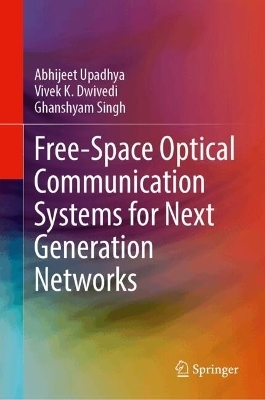
Free-Space Optical Communication Systems for Next Generation Networks
Springer International Publishing (Verlag)
978-3-031-74804-2 (ISBN)
- Noch nicht erschienen - erscheint am 07.12.2024
- Versandkostenfrei
- Auch auf Rechnung
- Artikel merken
This book provides insights in the field of free-space optical (FSO) communication, which is considered the next frontier for future-generation, broadband wireless networks. The authors discuss various factors limiting practical implementations of the mixed radio frequency/free-space optical (RF/FSO) relaying technology, to determine the impact of important parameters on the performance of mixed RF/FSO relaying systems. The book presents the various generalized channel models that can be adopted to model RF and FSO link statistics. Further, it presents the modeling of amplify-and-forward (AF) and decode-and-forward (DF) forms of cooperative relaying schemes. This book enables readers to understand the various mitigation techniques that can be utilized in mixed RF/FSO relaying in order to improve the overall user experience. The authors discuss the importance of artificial intelligence and machine learning in the field of wireless optical communication systems. Finally, the optical wireless channel modeling using both CNN and LSTM model is explored with their potential to enhance the accuracy and reliability of channel estimation.
Abhijeet Upadhya completed his PhD from JIIT, Noida, India in 2020. He completed his Master of Technology and Bachelor of Technology from AKTU, (formerly known as UPTU), U.P. India in 2014 and 2011, respectively. Currently, he is serving as an Assistant Professor with the Department of Electronics and communication engineering at JIIT, Noida, U.P., India. To date, he has published a number of quality research papers in SCI-indexed journals and continues to explore the vast area of Communication Engineering. He constantly provides support as a reviewer to various prestigious journals. His research interests include wireless communication systems, cooperative relaying, and free space optical communication systems. Other areas of research include statistical characterization and modeling of wireless fading channels, security analysis, and performance evaluation of digital wireless communication systems subject to interference. He has also found interest in the field of deep learning and machine learning in wireless communication systems. Vivek K. Dwivedi (Member, IEEE) received the Bachelor of Engineering degree from RGPV, Bhopal, India, in 2003, the Master of Engineering degree from the Birla Institute of Technology, Mesra, Ranchi, India, in 2006, and the Ph.D. degree in electronics and communication engineering from the Jaypee University of Information Technology, Solan, India, in 2012. He was a Senior Visiting Researcher in wireless communications with the University of Pretoria, South Africa, from 2014 to 2015. He is currently working as Professor with the Department of Electronics and Communication Engineering, Jaypee Institute of Information Technology, Noida, India. He has authored several research articles in refereed international journals and conferences. His primary research interests include machine learning, artificial intelligence, 5G, and optical wireless communication. He is serving as an Associate Editor of IEEE Access Journal. Ghanshyam Singh received Ph.D. degree in Electronics Engineering from the Indian Institute of Technology, Banaras Hindu University, Varanasi, India, in 2000. Currently, he is working as a full Professor and Director with the Centre for Smart Information and Communication Systems, Department of Electrical and Electronic Engineering Sciences, Auckland Park Kingsway Campus, University of Johannesburg, South Africa. He was associated with Central Electronics Engineering Research Institute, Pilani, and Institute for Plasma Research, Gandhinagar, India, respectively, where he was Research Scientist. He had also worked as an Assistant Professor at Electronics and Communication Engineering Department, Nirma University of Science and Technology, Ahmedabad, India. He was a Visiting Researcher at the Seoul National University, Seoul, South Korea. He also worked as Professor with the Department of Electronics and Communication Engineering, Jaypee University of Information Technology, Wakanaghat, Solan, India. He has more than 24 years teaching and research experience. His research and teaching interests include Millimeter/THz Wave Technologies it’s Applications in Communication and Imaging, Next-Generation Communication Systems (5G/6G)/Cognitive Radio/NOMA, Resource Allocation and Management, Interference Management, Applications of 5G/6G in Sustainable Smart City, Industry 4.0/5.0, Healthcare 4.0, Intelligent Transport System, Energy Management (IoE) and Digital Farming. He is an author/co-author of more than 370 scientific papers of the peer reviewed Journal and International Conferences and 10 books published by Springer, Wiley and CRC Press.
Chapter 1. AN INTRODUCTION TO FREE SPACE OPTICAL SYSTEMS.- Chapter 2. PERFORMANCE ANALYSIS OF MIXED RF/FSO SYSTEMS OVER - mi FADING CHANNELS.- Chapter 3. INTERFERENCE LIMITED DUAL HOP RF/FSO AF RELAYING OVER - mi TURBULENCE CHANNELS.- Chapter 4. RELIABILITY ANALYSIS FOR INTERFERENCE LIMITED MIXED MUD-RF/FSO VARIABLE GAIN AF COOPERATIVE RELAYS OVER D-GG CHANNEL.- Chapter 5. UAV-FSO COOPERATIVE RELAYING SYSTEM WITH GENERALIZED INTERFERENCE MODEL.- Chapter 6. IMPACT OF INTERFERENCE ON MIXED RF/MIMO-FSO RELAYING SYSTEMS.- Chapter 7. NOMA AIDED INTERFERENCE LIMITED MIXED RF/FSO RELAYING.- Chapter 8. ROLE OF ARTIFICIAL INTELLIGENCE/MACHINE LEARNING IN FREE SPACE OPTICAL COMMUNICATION NETWORKS.- Chapter 9. DEEP LEARNING ENABLED CHANNEL ESTIMATION FOR FSO SYSTEMS.- Chapter 10. CNN AND LSTM DEEP LEARNING MODELS FOR CHANNEL ESTIMATION OF TWO-WAY RELAYING IN THE PRESENCE OF HARDWARE IMPAIRMENT.
| Erscheinungsdatum | 17.11.2024 |
|---|---|
| Zusatzinfo | XXI, 188 p. 46 illus., 45 illus. in color. |
| Verlagsort | Cham |
| Sprache | englisch |
| Maße | 155 x 235 mm |
| Themenwelt | Mathematik / Informatik ► Informatik ► Theorie / Studium |
| Technik ► Elektrotechnik / Energietechnik | |
| Technik ► Nachrichtentechnik | |
| Schlagworte | AI in Free-Space Optical Communication Networks • Mixed RF/FSO Systems • Optical Communications and Networking • Optics Communication • Transceiver Design for Free-Space Optical Communication |
| ISBN-10 | 3-031-74804-2 / 3031748042 |
| ISBN-13 | 978-3-031-74804-2 / 9783031748042 |
| Zustand | Neuware |
| Haben Sie eine Frage zum Produkt? |
aus dem Bereich


